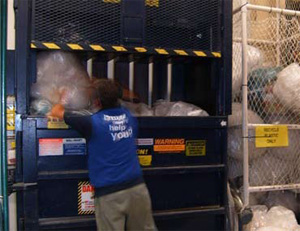Zero Waste Initiative
Our stores around the world are recycling millions of pounds of materials generated from the back of our stores. We're reducing the amount of waste sent to landfills and our need to use virgin materials.
Americas
United States

In 2008, we really started seeing results of the super sandwich baling process we instituted in all of our stores, Sam's Club locations and additional facilities in 2007. This process helps us recycle loose plastic and cardboard, along with 32 additional items, including aluminum cans, plastic hangers, plastic water and soda bottles, office paper and paperback books. Since integrating this process into our facilities, we have redirected 18.9 million pounds of plastic hangers, 12.4 million pounds of office paper and 1.3 million pounds of aluminum from going to landfills. And we continue to increase the amount of plastic and cardboard we have been able to recycle. We estimate that we have redirected more than 182 million pounds of plastic from landfills and sent more than 25 billion pounds of cardboard to paper mills across the U.S. and Asia to be recycled.
We are also helping our customers recycle their old electronics, which can often be hard to do. In May 2008, Sam's Club partnered with N.E.W. Customer Service to start an online recycling program for unwanted electronics. Anyone can log on to the Web site www.econewonline.com/samsclub, enter information on their used electronic item and find out whether or not they can get money back for sending it in. Once the item is sent to N.E.W. for free, the amount eligible to be refunded will be given back to the customer on a Sam's Club gift card.
Brazil
Wal-Mart Brazil is working to create "Zero Impact" when it comes to waste. In 2008, 273 associates were trained to take part in the Zero Impact program, which will reduce the waste sent to landfills. Currently, 89 stores in the country are participating in the program, and Wal-Mart Brazil aims to have all of its stores in the program by 2010.
Wal-Mart Brazil is also participating in a unique relationship with waste collectors in the country. In Brazil, some impoverished people earn money by rummaging through waste to collect recyclable items. Wal-Mart Brazil and Wal-Mart Institute (Brazil) initiated the Station Recycling Project in partnership with the Coca-Cola Brazil Institute and Coca-Cola Brazil. The project involves providing centrally-located collection posts for recyclables at the network of Wal-Mart stores throughout the country and at 25 Coca-Cola supplier factories. By providing the recycling stations, people now have a place to drop off their recyclable items, the recycling infrastructure in Brazil is strengthened and the income generation achieved by the cooperative of garbage collectors is improved.
Central America
Our distribution centers in Central America have been diligent about recycling materials. In 2008, Wal-Mart Central America was able to recycle 13,137 tons of cardboard and 1,299 tons of plastic. This helped eliminate the need for more than 223,000 trees and more than 14,000 barrels of oil.
Puerto Rico
In 2008, as part of Wal-Mart Puerto Rico's annual recycling challenge "Tomatelo en Serio," students, associates and customers collected 57 percent more materials than the previous year. The program is an educational alliance with the Puerto Rico Solid Waste Authority, the Puerto Rico Education Department, Yo Limpio a Puerto Rico, and Pepsico. Nearly 80,000 students and 231 schools brought their recyclable items to Wal-Mart stores, which served as collection centers for the recycling challenge.
Europe
United Kingdom
During the last few years, our ASDA stores in the U.K. have established a comprehensive recycling program which has helped them redirect 65 percent of store waste from the landfill. At the end of 2008, ASDA opened the U.K.'s first store that aims to reach zero landfill waste in Bootle. Currently, the store serves as a demonstration of the model that will help ASDA achieve its zero-waste-tolandfill goal by the end of 2010.
At the heart of this program are the regional ASDA Service Centers (ASCs). Recyclable materials are transported to these facilities from stores in the surrounding area using empty delivery vehicles on their return run — a process known as backhauling — which means they don't need to put more trucks on the roads just to transport these commodities. Once at an ASC, the waste is bundled together and stored, ready to be sent for recycling. As of 2008, ASDA had seven of these ASC, swith one more to be constructed to complete the network.
In 2007, this initiative helped ASDA recycle more than 165,000 tons of cardboard and nearly 8,000 tons of plastic wrapping. Now, ASDA is continuing to move toward its zero-waste goal and aims to eliminate the remaining 35 percent of its waste.
Asia
Japan
Our Seiyu stores in Japan are able to recycle approximately 75 percent of their total store waste by separating waste into 12 different categories. In 2008, Seiyu was able to establish new ways to reduce food-related waste, further reducing the amount of waste sent to landfills. This year, Seiyu aims to have sustainable solutions for 80 percent of its store waste.




